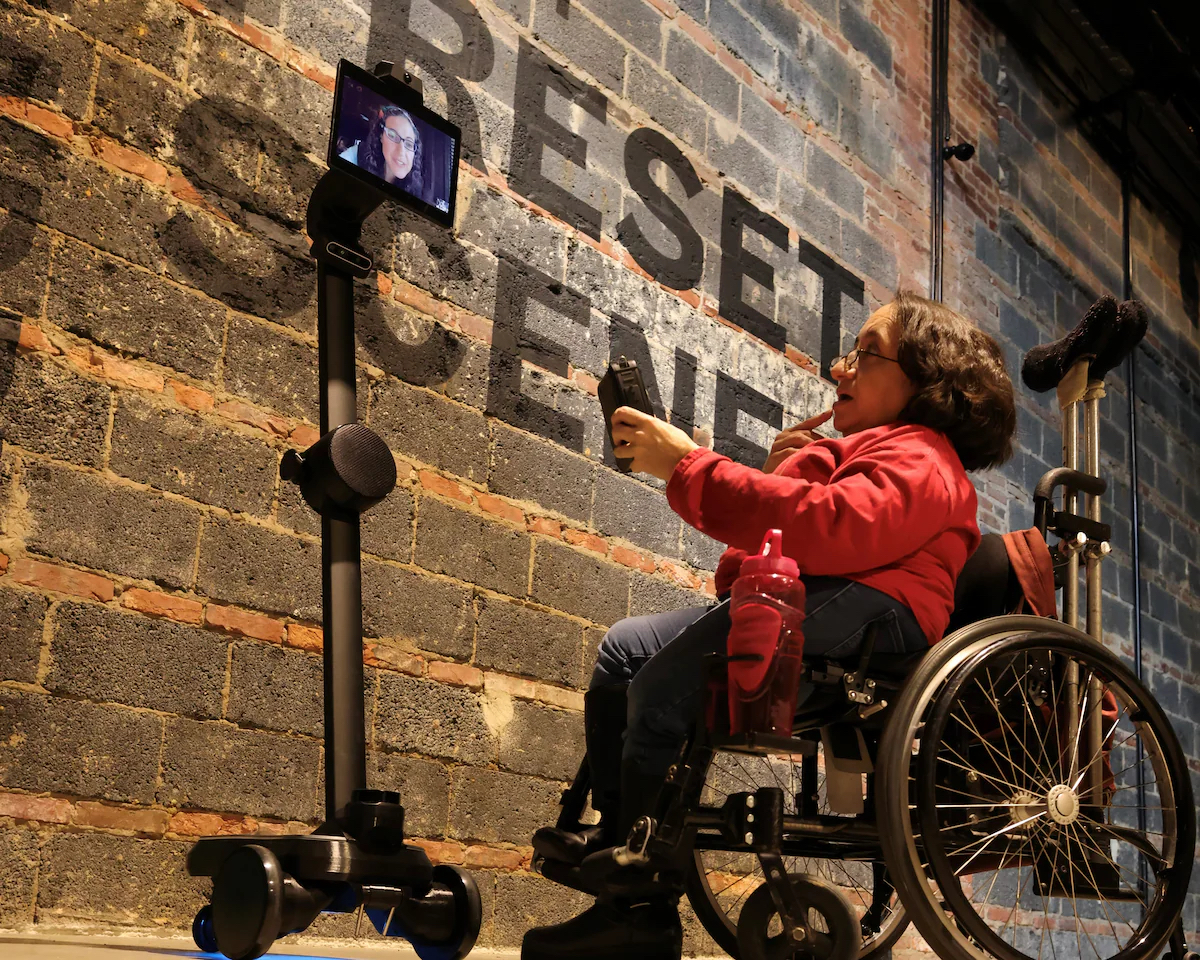Dans le cadre de la série de podcasts "ArtsAbly in Conversation", Diane Kolin a interviewé Lisa Sniderman, une dramaturge de théâtre musical, compositrice, joueuse de ukelele et chanteuse connue sous son nom d'artiste, Aoede, qui vit en Californie.

Ce billet présente les ressources mentionnées par Lisa Sniderman au cours de la conversation.
Lisa Sniderman alias Aoede
Lisa Sniderman (Lis) est une artiste et dramaturge plusieurs fois primée, connue sous son nom d'artiste, Aoede. En tant qu'artiste handicapée, Sniderman crée - et met souvent en scène des personnages malades - pour exprimer, favoriser la guérison, élever, responsabiliser et défendre les personnes atteintes de maladies chroniques et de handicaps. Elle a reçu plus de 100 prix et distinctions pour ses compositions, ses albums, ses films, ses pièces de théâtre, ses créations orales et ses livres, tout en luttant depuis 16 ans contre une maladie auto-immune rare et invalidante : Dermatomyosite et le déficit immunitaire commun variable (DICV). La musique et l'art sont ma planche de salut, je ne peux pas m'arrêter de créer", explique-t-elle. Elle était tellement occupée à créer que Sniderman admet qu'elle a oublié de faire le deuil de sa maladie. Elle a également été confinée à la maison pendant de nombreuses années, le théâtre lui manquant, et elle a eu l'idée d'apporter le théâtre à ceux qui lui ressemblent par le biais de représentations théâtrales filmées, ce qui a donné naissance au livre audio "The Grieving Project" (Le projet de deuil). Elle est en train d'adapter ce livre audio en une comédie musicale afin de faire vivre des expériences théâtrales aux malades chroniques et aux personnes handicapées.
Visitez le site web de Lisa Sniderman
Voir la vidéo "Keep Shining" (en anglais)
Le projet de deuil
Le spectacle est ancré dans le concept de l'accessibilité radicale et de l'utilisation de la technologie, avec pour principe directeur de faire tomber les barrières du théâtre vivant et de la communauté. Mon équipe et moi-même avons développé The Grieving Project pour offrir des expériences théâtrales en direct, accessibles et immersives à ceux qui, comme moi, ne peuvent pas assister à des représentations théâtrales. Ma vision et mon concept s'appuient fortement sur l'intégration de technologies innovantes pour aider à créer des expériences théâtrales virtuelles et en direct comparables. Cela comprend : des projections, des expériences audio et numériques immersives - par exemple, la participation au spectacle en communauté avec d'autres dans un théâtre virtuel - un espace virtuel appelé The Meadow où notre public peut interagir avec un environnement généré par ordinateur et avec d'autres membres du public. Notre public en ligne peut entrer dans un théâtre virtuel dans le hall numérique, prendre place dans le théâtre et choisir ses angles de caméra pendant la représentation comme un spectateur en direct changerait son regard, et faire partie de la communauté du théâtre en direct.
Visitez le site web de The Grieving Project
Voir la vidéo sur la validation du concept (6 minutes)
Les études critiques du handicap (CDS) et le modèle social du handicap
De nombreuses sources sur la CDS sont disponibles. En voici une, émanant du Critical Disability Studies Collective hébergé par l'université du Minnesota. Elle répond aux questions suivantes : Qu'est-ce que les Critical Disability Studies (CDS) ? Pourquoi faire des CDS ? Qu'est-ce qui est considéré comme un handicap ? Je n'ai pas l'habitude de considérer le handicap comme un problème non médical ; par où commencer ? Et d'autres sujets connexes.
Visitez le site web du collectif Critical Disability Studies
RAMPD
RAMPD (Recording Artists and Music Professionals with Disabilities) est une plateforme professionnelle qui dote l'industrie de la musique et du spectacle vivant d'outils, de programmes et de stratégies favorisant l'intégration des personnes handicapées. RAMPD connecte également l'industrie à un répertoire mondial de créateurs de musique/son et de professionnels de l'industrie ayant un handicap, une neurodivergence et d'autres conditions chroniques ou de santé mentale, afin de trouver des sources et d'embaucher - apportant des opportunités compétitives, une visibilité et une communauté à nos membres professionnels tout en offrant l'inclusion du handicap aux partenaires de l'industrie/des lieux de spectacle. La mission du RAMPD est d'amplifier la culture du handicap, de promouvoir l'inclusion équitable et de plaider pour des espaces inclusifs et accessibles dans les industries de la musique et du spectacle vivant. Fondé en mai 2021 (et établi en janvier 2022) par l'artiste primé et activiste culturel Lachi, le RAMPD a vu le jour après qu'une discussion publique entre la Recording Academy et plusieurs artistes handicapés ait révélé le grave manque de visibilité, d'accès et de représentation pour les professionnels de la musique en situation de handicap.
Visiter le profil RAMPD de Lisa Sniderman
Lachi
Lachi est une auteure-compositrice-interprète, une artiste de tournée, une productrice, une actrice, une auteure, une défenseuse des personnes handicapées et une activiste culturelle basée à New York. La musique de Lachi est souvent décrite comme de la musique pop ou de la musique de danse. Elle est légalement aveugle en raison d'un colobome. Tout au long des années 2021 et 2022, Lachi s'est imposée comme l'une des principales défenseuses des personnes handicapées dans l'industrie musicale, s'exprimant et se produisant dans des lieux tels que la Maison Blanche, les Nations Unies, le Kennedy Center, le Lincoln Center et la BBC, parmi d'autres apparitions notables. Lachi est le fondateur du RAMPD. À partir de 2022, le RAMPD a commencé à travailler en partenariat avec la Recording Academy pour rendre les Grammy Awards plus accessibles : il a travaillé à l'ajout d'une estrade à rampe visible, d'interprètes en langue des signes, de sous-titrage en direct, de description audio, de langue des signes américaine et de rampes d'accès sur le tapis rouge. En février 2024, Lachi a été nommée "Femme de l'année 2024" par USA Today.

